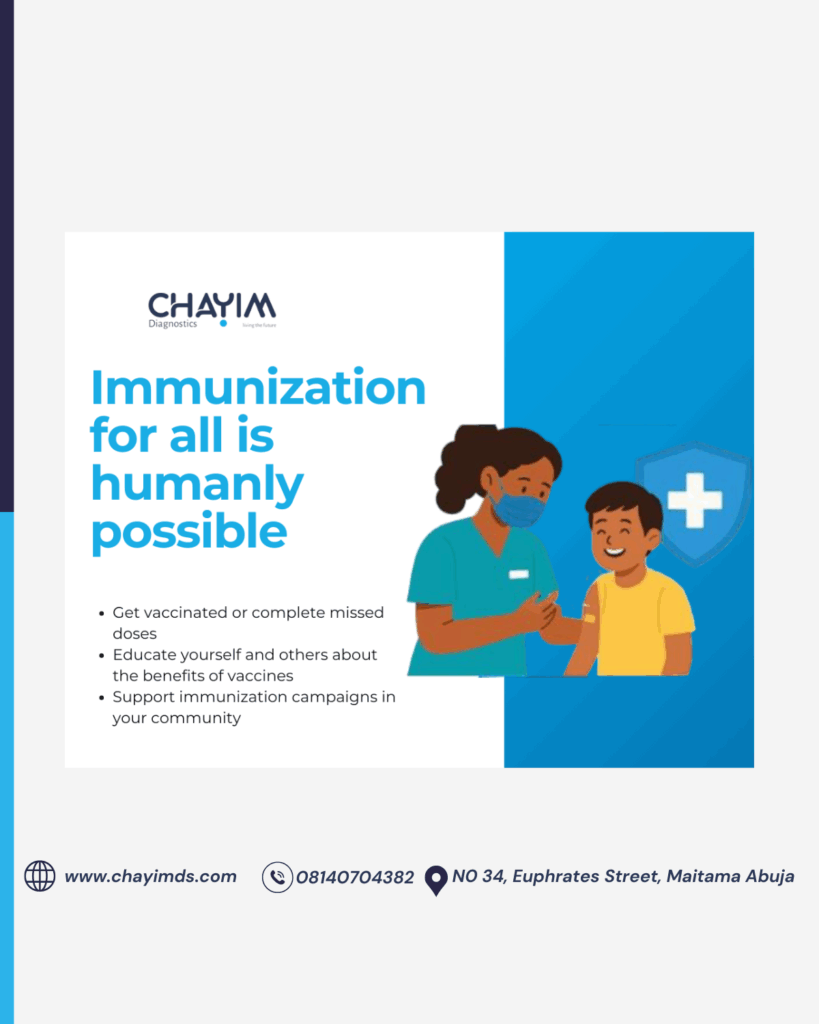Immunization for All

A Call to Protect Every Life, at Every Age
Vaccination remains one of the most powerful achievements in modern medicine. It has transformed global health and saved countless lives yet, many people still miss out on critical vaccines due to lack of access, misinformation, or inequality. Today, we shine a light on the power of vaccines for individuals of all ages.
Let us paint a picture.
A female child and a male child were born in the same community, just weeks apart. The girl received all her childhood vaccinations against polio, measles, and more thanks to proactive, well-informed parents and access to healthcare. She grew up healthy and strong, rarely battling serious illness. The boy, however, wasn’t vaccinated due to misinformation. By age seven, he had suffered severe measles that affected his vision and endured multiple hospital visits for preventable diseases. As adults, the contrast is even clearer: the woman continues to protect herself by getting vaccinated against diseases like hepatitis B and HPV, while the man struggles with chronic health issues rooted in illnesses that could have been prevented.
In this article, we want to remind you that when you have the right information, Immunization for all is humanly possible. Understanding what vaccines are needed at each stage of life is the first step toward ensuring that everyone, regardless of age, has access to the protection they deserve.
Let’s begin by exploring the immunizations you need at all ages
Vaccines for Children
From birth, children are vulnerable to infections that can lead to serious complications or death. Childhood immunization provides lifelong protection against life-threatening diseases. Here is a list of some essential vaccines for children recommended by The World Health Organization (Recommendations for Routine Immunization, 2024)
- BCG (Bacillus Calmette–Guérin) – Protects against tuberculosis
- Hepatitis B – Prevents liver infections
- OPV/IPV (Polio) – Eradicates risk of paralysis from poliovirus
- DTP – Combats diphtheria, tetanus, and pertussis (whooping cough)
- Hib – Prevents Haemophilus influenzae type b infections
- Pneumococcal vaccine – Shields against pneumonia, meningitis
- Rotavirus vaccine – Prevents severe diarrhea in infants
- Measles, Mumps, Rubella (MMR) – Provides triple protection against common childhood illnesses
- Yellow Fever (in endemic countries)
Vaccination schedules often begin at birth and continue at 6, 10, and 14 weeks, with boosters given at key milestones like 9 months and 18 months. Always follow immunization schedules strictly. Timely immunization is critical.
Vaccines for Adolescents
The teenage years bring new risks, especially with increased social interaction and bodily changes. Immunizations in this stage help protect against infections that affect long-term health. Here is a list of some essential vaccines for Adolescents recommended by The World Health Organization (Recommendations for Routine Immunization, 2024)
- HPV (Human Papillomavirus) – Recommended for boys and girls as early as age 9. It protects against cervical and other cancers. Vaccines are recommended early enough to ensure it is done before exposure to the virus and also significantly reduces future risk.
- Tdap Booster – Reinforces immunity against tetanus, diphtheria, and pertussis
- Meningococcal vaccine – Prevents bacterial meningitis, especially in group-living settings
- Hepatitis A and B – For those not vaccinated earlier
- Influenza (Flu Shot) – Recommended annually
Immunization for Adults
Adults need vaccines too, to maintain immunity, protect against age-related risks, and prepare for travel, employment, or pregnancy. Here is a list of some essential vaccines for Adults recommended by The World Health Organization (Recommendations for Routine Immunization, 2024)
1. COVID-19 Booster – Especially for those with comorbidities (the condition of having two or more diseases at the same time) or above 50
- Tetanus-Diphtheria (Td) booster – Every 10 years
- Hepatitis B – If not previously vaccinated
- Influenza (Flu Shot) – Every year
- Pneumococcal vaccine – For adults aged 65+ or with chronic illnesses
- Shingles vaccine – Recommended at age 50+
- HPV vaccine – Catch-up vaccination up to age 26, and in some cases up to 45
- Travel vaccines – Yellow Fever, Typhoid, Cholera, etc. depending on destination
Special Populations:
- Pregnant Women – Tetanus, Flu, and sometimes Hepatitis B
- Elderly Adults – Need special attention for pneumonia, shingles, and flu.
Immunization is one of the most affordable and effective tools we need to prevent illness, protect families, and build healthier communities.
Let’s remember:
Immunization for all is humanly possible when we all play our part.
Let’s vaccinate, educate, and celebrate the power of prevention.
Because a world free of vaccine-preventable diseases starts with You.



Responses